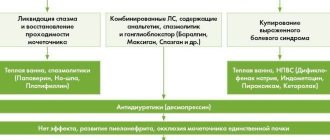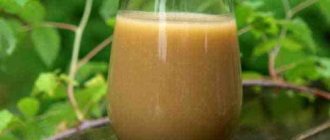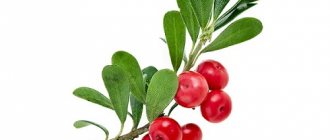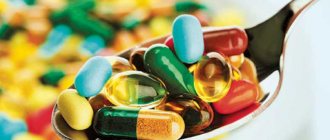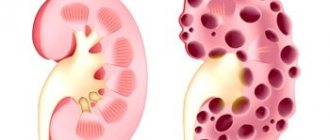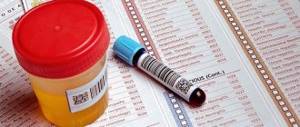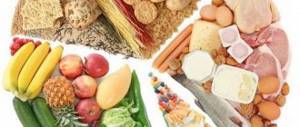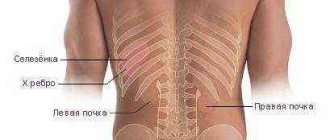Pyelonephritis, pyelitis and other infectious and inflammatory diseases of the kidneys are a common problem in modern healthcare. Their treatment should be comprehensive and include drug therapy, restorative procedures, and exercise therapy. Patients with such diseases should pay attention to their diet: a diet for kidney inflammation can facilitate the functioning of the urinary system and even prevent the development of complications.
Diet for kidney inflammation in adults
Inflammation of the kidneys appears as a result of hypothermia, stressful shocks, intoxication, and many other reasons.
This disease is characterized by lower back pain, nausea, fever, and change in the color of urine.
In addition to standard methods - hospitalization, drug therapy with antibacterial and anti-inflammatory drugs - a special diet for kidney inflammation is also used as treatment.
Dietary nutrition for kidney inflammation
There is a distinction between acute and chronic pyelonephritis (inflammation of the kidneys). Accordingly, for each type of disease and its stage, a course of treatment is selected, medications and a certain diet are prescribed.
But in any case, one or another diet will be prescribed, since it is extremely important to relieve the body of stress in all diseases, especially with inflammation of the kidneys and bladder.
At any stage, fatty, spicy foods, chocolate, spices, and alcohol are completely excluded from the patient’s diet.
Therapeutic benefits of diet
The kidneys are the body's filter, processing and purifying tens of liters of blood every day. They remove salts and toxins, separating them from the beneficial elements necessary for humans. With pyelonephritis, the kidneys cannot cope with their functions, which entails not only a failure in the processes of renal metabolism, but also other serious consequences.
Proper nutrition does not harm anyone; after consulting with a doctor, you can more accurately choose the appropriate regimen, the list of products allowed for acute or chronic inflammation.
Indications for use
Diet is an effective remedy for any disease, but if you do not follow it properly, you may not only fail to achieve the desired effect, but even worsen the situation. Therefore, there are a number of requirements explaining what and how you can eat if you have kidney inflammation. A new menu doesn't have to be stressful. It is also important to observe the level of nutritional value of food - from 2.5 thousand calories per day.
Fasting days are of no small importance in the treatment of pyelonephritis. But before that, you need to discuss all the nuances with your doctor. The different options are:
Accordingly, such days involve focusing on a specific product.
Cooking tips
In acute pyelonephritis, food is mainly boiled, steamed or stewed, fried foods are completely excluded, everything should be lean. It is noteworthy that even for vegetables and fruits allowed in unlimited quantities, heat treatment is recommended.
With the relief of symptoms of the acute stage, in case of chronic pyelonephritis, the list of permitted products is somewhat expanded, but the doses are still strictly observed.
A special place in the diet for kidney inflammation in adults is occupied by folk remedies prepared in the form of decoctions of willow, corn, bearberry, infusions from rod shoots and comfrey roots, as well as powder from nettle leaves and licorice.
Diet and drinking regimen
In case of chronic inflammation, the diet is aimed at stabilizing blood pressure, metabolism in the body, and regulating the patient’s water balance. In the first days of illness, the amount of drinking increases significantly.
Adults are usually prescribed to drink 2-3 liters of fluid, while for children the volume is calculated using the formula: the child’s weight is multiplied by 30, and then by another 1.5.
List of what you can eat if you have kidney inflammation:
The main restrictions apply to salt, essential oils, daily intake of carbohydrates, proteins, and fats.
In case of acute kidney inflammation, on the contrary, food intake is reduced: fish, meat, protein, vegetables.
As with chronic pyelonephritis, salt is also excluded from the diet to the maximum. Instead, some spices (dried herbs, cinnamon), citric acid, and sauces are allowed. Since complete abstinence from salt is impossible for the body, it is periodically reintroduced into the diet and then removed again.
Products you need
In addition to water, it is recommended to drink herbal infusions, natural juices (but not citrus fruits), weak sweet tea, and compotes.
For variety, fruits and vegetables with a high water content are introduced into the diet:
When consumed, a positive diuretic effect is also manifested.
In general, recommended foods include: bread without salt, vegetarian soups, lean meat and fish, honey, baked and boiled vegetables, fruits, a little sugar, butter.
Fermented milk products are of particular importance in the diet for kidney inflammation in adults:
But it is important to remember that heavy cream and sour cream are not included in this list.
Dangerous products
With pyelonephritis, fatty, spicy, fried foods, as well as smoked, salted, and pickled foods are prohibited. List of what not to eat during exacerbation of kidney inflammation:
- snacks;
- canned food;
- coffee, cocoa, strong tea;
- legumes;
- mushrooms;
- fatty meat, fish;
- chocolate and sweets;
- alcohol;
- hard cheeses;
- salo;
- fish roe;
- spicy foods (such as garlic, horseradish, mustard).
This list requires special attention not only for those suffering from pyelonephritis, but also for healthy people.
Menu for the week
The first days, the diet for kidney nephritis (a collective designation for inflammatory diseases of the paired organ) is not varied, the volume of liquid consumed increases - compotes, fruit drinks, jelly and unsweetened teas.
Fruits and vegetables after heat treatment are allowed in almost unlimited quantities. The consumption of proteins, phosphorus and sodium should be reduced.
The following days will benefit from a dairy diet; towards the end of the week you can gradually expand the list of products - eat soups, purees, cereals.
Dishes for a healthy diet for kidney inflammation
Eating right doesn't mean it tastes bad. There are many varied and simple recipes.
There are two main generally accepted diets: “Table No. 7” (for acute pyelonephritis and in the recession stage), “Table No. 7a” (for the chronic form of the disease, as well as for renal failure).
Compliance with such nutritional standards involves avoiding prohibited foods and dishes, but consuming those that are included in the list of permitted ones.
Source: https://za-dolgoletie.ru/info/dieta-pri-vospalenii-pochek-u-vzroslyh/
Prohibited foods for pyelonephritis
The diet for pyelonephritis prohibits all foods that irritate the urinary tract and have a stimulating effect on the nervous system.
Since the excretory function of the kidneys is impaired, free fluid is limited.
They also reduce the amount of animal protein (meat, fish), since protein oxidizes urine.
It is also worth excluding products containing extractive substances, large amounts of oxalic, uric acid and essential oils.
Easily digestible carbohydrates are consumed with caution (they create an acidic environment in the urine, which is favorable for the growth of bacteria). For the same purpose, legumes are limited.
The list of prohibited products includes:
- rich broths and soups made from them (meat, fish, mushroom); after boiling, the water should be drained and new water should be added, bringing the meat and fish to readiness; soups made from legumes are also not recommended;
- bread and flour products with added salt;
- fatty fish, as well as smoked and salted fish, caviar, seafood;
- canned meat and fish, sausages, sausages, especially fried or grilled, smoked products;
- fatty meats, fried and stewed meat without prior boiling;
- all legumes, onions, garlic, radishes, radishes, sorrel and spinach are sources of uric acid, canned vegetables (salted, pickled, pickled);
- mushrooms in any form;
- sauces from meat, fish and mushrooms, pepper, horseradish, mustard;
- sharp and fatty cheeses;
- animal fats (pork lard), cooking fats;
- strong coffee (natural and instant), strong tea, mineral water with sodium salts, cocoa;
- chocolate, cakes, pastry creams, high-fat sour cream.
Principles of nutrition for kidney nephritis and bladder inflammation
The diet for kidney inflammation is followed for at least 12 months. A properly selected nutritional plan will normalize the water-salt balance, remove swelling, and improve the patient’s condition. And also a therapeutic diet for kidney diseases increases the effect of medications.
At the moment, “Table No. 7” is considered the most effective diet for various pathologies of the genitourinary organs. This nutrition system was developed by the famous doctor M.I. Pevzner.
Basic principles of nutrition
The diet is effective for kidney nephritis (acute and chronic), cystitis, and urolithiasis. And also for any inflammatory and infectious diseases of the urinary system.
Depending on the severity of the disease, restrictions on salt are introduced; in most cases, this food additive is removed from the diet completely.
Another important principle of the diet is to reduce the consumption of protein products; a specialist calculates the permissible amount. It is absolutely impossible to completely exclude protein from the diet for a long period of time, as this will negatively affect the condition of the body.
A diet for inflammation of the kidneys and bladder requires compliance with the drinking regime:
- Adults need to drink 2–2.5 liters of fluid.
- Children – 1–1.5 liters.
You can drink not only clean water, but also fruit drinks, juices, and herbal teas. The exceptions are: citrus drinks, coffee, cocoa, sweet sodas.
You need to eat small meals, every 3-4 hours. The patient's diet must be balanced. Preference should be given to boiled, baked or stewed dishes. Alcoholic beverages are prohibited.
In case of kidney inflammation, the diet in each case is adjusted individually by a specialist: the degree of the disease, age, and the presence of chronic diseases are taken into account.
These are the basic principles of nutrition during the inflammatory process in the kidneys in adults and children.
It is allowed to use herbs, some light sauces, lemon and lime juice as seasonings.
List of prohibited and permitted products
The following foods are excluded from the patient’s diet:
- marinades and canned food;
- fatty meats;
- fatty fish;
- chocolate;
- smoked meats;
- garlic;
- horseradish;
- mustard;
- cheese;
- mushrooms;
- fast food.
The above foods should not be eaten, as they contain a lot of salt, can cause allergies or place increased stress on the affected organ.
Having studied the list of prohibited foods, many patients ask the question, what can be eaten with this pathology?
What to eat for this pathology:
- any cereals;
- fruits other than citrus fruits;
- vegetables, except radishes, legumes, onions;
- eggs;
- honey, marmalade, jam;
- low fat dairy products;
- lean meat;
- whole wheat bread;
- not fatty fish.
The list of permitted foods is quite extensive, so nutrition for kidney inflammation is complete and balanced. The main thing is to choose the right menu.
Sample five-day menu
As already mentioned above, the patient’s diet should be as balanced as possible; this is necessary not only to saturate the body with important microelements and vitamins, but will also help to avoid breakdowns.
First day:
- Morning: milk noodle soup, tea.
- Snack: watermelon, melon.
- Lunch: steamed cutlets, cucumber salad, lingonberry juice.
- Snack: crackers, tea.
- Dinner: cottage cheese casserole.
- Snack: jelly.
Second day:
- Morning: buckwheat porridge, tea.
- Snack: kefir.
- Lunch: Lenten beetroot soup, boiled potatoes with stewed veal, herbal tea.
- Snack: plums.
- Dinner: grilled vegetables, steamed fish, sea buckthorn compote;
- Snack: bread, yogurt;
The third day:
- Morning: omelet, compote.
- Lunch: baked potatoes, fresh cabbage salad with vegetable oil, cranberry juice.
- Snack: whole grain bread with jam, green tea
- Dinner: vegetable cutlets with sour cream and herbs sauce.
- Snack: apple.
Fourth day:
- Morning: oatmeal, tea, marmalade.
- Snack: candied fruits.
- Lunch: pumpkin soup, currant broth.
- Snack: pear.
- Dinner: durum wheat pasta, boiled chicken, vegetable salad.
- Snack: soy bar, tea.
Fifth day:
- Morning: boiled egg, bread with butter, sage infusion.
- Snack: baked apples.
- Lunch: baked fish, rice, berry compote.
- Snack: marshmallows, herbal tea.
- Dinner: buckwheat porridge, mineral water.
- Snack: dried fruits.
During diet therapy, it is recommended to eat at home and not visit restaurants and cafes.
For kidney inflammation, drink radish juice mixed with honey; this drink has a cleansing, diuretic, and antimicrobial effect.
Diet plays a big role in the treatment of kidney inflammation. Thanks to proper nutrition, recovery occurs much faster. To avoid complications, you cannot create a treatment menu yourself; a doctor’s supervision is required.
Source: https://pochki2.ru/lechenie/dieta/pri-vospalenii-pochek.html
Diet No. 7b
Therapeutic diet No. 7b is prescribed when acute nephritis subsides and is a transition from diet No. 7a to diet No. 7.
The diet of diet No. 7b is based on white salt-free bread, lean meats, lean boiled fish (consumed 1-3 times a week), no more than 2 grams of table salt per day (in products no more than 4 grams of salt per day), free fluid no more than one liter per day.
Diet for nephritis belongs to the categories - therapeutic diets.
| < Therapeutic diet No. 12 | Kefir diet for infectious diseases > |
all-diety.ru
Diet for kidney inflammation
In case of kidney inflammation, strict adherence to the diet is necessary. A certain diet will help reduce the load on the organ during periods of disruption of the normal course of life processes.
The patient’s menu should include products that will help remove waste and toxins from the body.
By strictly following the diet developed by a nutritionist, you can avoid various exacerbations and side effects.
An organism weakened by a disease needs a large amount of minerals and vitamins. One of the basic rules of the diet for kidney inflammation is split meals. If you eat 4 to 5 times a day, your body will quickly get used to the new diet.
The menu must include diuretic drinks, this will help improve kidney function and cleanse the urinary tract.
The breakdown products of any type of alcohol destroy kidney cells, so you must completely stop drinking alcohol.
In order not to overload the body weakened by kidney inflammation, it is necessary to exclude the following foods from the diet:
- mushrooms;
- canned and smoked foods;
- chocolate;
- fat meat;
- fatty fish;
- some vegetables - horseradish, raw garlic and onions, raw and sauerkraut, radishes, overripe eggplants.
For chronic kidney inflammation, the diet includes boiled, baked, and sometimes fried food of any consistency and temperature. If the disease worsens, then the nutritional rules are limited; the amount of salt, for example, should not exceed 8 grams per day. Salty food leads to swelling and complications.
During remission
In order for remission not to turn into an exacerbation, it is necessary to restore the acid-base balance. The patient's menu should include foods high in alkali - beets, cucumbers, radishes, broccoli, lemon and grapes.
Broths made from lean meat will help reduce the entry of negative substances into the kidneys. During the cooking process, experts recommend draining the water 2-3 times and replacing it with new one.
This way you minimize the content of irritating substances in the dish.
The body also needs potassium; dried fruits, legumes, dried porcini mushrooms, cocoa powder, seaweed, parsley and sorrel contain large quantities of it. These products prevent the formation of kidney stones.
The patient should drink about two liters of fluid per day, including diuretic tea. It is better to drink water raw, not boiled. For 1 kg. a person needs to drink about 30 ml per day. clean water, rosehip decoction or healthy medicinal herbs.
On average it turns out to be about 2 liters.
For chronic nephritis
If you want to speed up the recovery process, you will have to eat for a long time, taking into account restrictions on foods and drinks. It is advisable for patients with chronic nephritis to adhere to a special diet throughout their lives. Over time, you will get used to it and this will become your normal diet.
Let's consider one of the many options for a daily diet.
- In the morning you can eat a light casserole or omelet cooked in a double boiler. Supplement your breakfast with low-fat cheese without salt, bread and, if desired, oatmeal.
- For first courses, give preference to vegetable nutritious broths and pumpkin soup.
- For the main course, eat a few meatballs from baked vegetables, low-fat fish, steamed. Boiled chicken and beef, stewed vegetables, and cereal porridges are allowed.
- Fruits, kefir, natural juice, and candied fruits are ideal as a snack.
- Allowed drinks are herbal decoctions, weak tea, dried fruit compote.
During an exacerbation
As during the period of remission, in this case the body needs alkalizing foods. The right food will help quickly eliminate pain and other unpleasant symptoms and normalize the pH level in urine.
In the first time after an attack, the patient is forced to eat only vegetables and easily digestible foods. After some time, depending on the patient’s condition, chicken and beef can be gradually introduced into the diet.
All dishes must be steamed or boiled.
Protein products are prohibited, except for egg white omelettes. The preferred diet is dairy-vegetable, rich in vitamins and other beneficial substances. The diet will help speed up the onset of remission as much as possible and prolong this period. Products containing a lot of potassium and diuretic drinks that can quickly remove harmful substances from the body are useful.
Fasting days
You need to switch to a special diet gradually. It’s better to start with simple fasting days. On such a day it is forbidden to drink or eat. It is prohibited to conduct such experiments on your own. Be sure to consult a medical specialist first and make sure there are no contraindications.
Fasting days are supplemented with a special diet. The calorie content of the diet decreases, and as a result, the load on the kidneys becomes minimal. Some experts recommend mono-diets and the following diets as fasting days.
- During one day you are allowed to drink 5 glasses of sweet tea (2 teaspoons of sugar per 1 glass of drink).
- Unloading on potatoes. During the day you are allowed to eat 1 kg. potatoes. It is best to cook it in the oven, without adding salt or oil. Use in equal portions (5-6 parts) throughout the day.
- Cleansing the body with a watermelon diet. You can only eat fresh watermelon, small in size.
Prohibited Products
If you decide to adhere to proper nutrition aimed at eliminating inflammation in the kidneys, carefully study the list of prohibited foods. Doctors advise avoiding rich meat broths, legumes, and mushrooms. Everything fried and fatty is strictly prohibited.
Give preference to lean varieties of fish and meat. Make it a habit to cook everything in the oven, steamer or boil. Chocolate, and even minor additions of it, for example in cookies or buns, are harmful to the kidneys. Lard and fat are prohibited. As for drinks, you should forget about alcohol, including beer, cocoa and strong coffee. Spicy seasonings, sausage, and smoked foods are harmful.
If you strictly follow all the medical recommendations presented in this article, you can quickly get rid of kidney disease and prevent relapse.
Source: https://uran.help/therapy/dieta-pri-vospalenii-pochek.html
Diet No. 7a
Diet No. 7a is prescribed for acute nephritis and its exacerbation.
The diet of diet No. 7a includes only boiled and pureed vegetables, fruits rich in potassium salts (apricots, dried apricots, raisins), in moderation, the diet for nephritis allows the consumption of flour and cereal dishes (buckwheat porridge with low-fat milk), weak tea with low-fat milk, sugar (no more than 70 grams per day), salt-free white bread, butter (no more than 30 grams per day), no more than 800 ml of free liquid per day.
Diet No. 7a completely eliminates salt consumption. This diet for nephritis must be supplemented with vitamins C, K, B. Meals on therapeutic diet No. 7a should be fractional.
With the development of uremia, the amount of protein is reduced to 25 grams per day. First of all, it is necessary to reduce the content of vegetable proteins (cereals, legumes, flour products), because These proteins are inferior in biological value to animal proteins and only overload the body. On a diet for nephritis, sugar or glucose is prescribed in large quantities (no more than 150 grams per day).
Diet for kidney inflammation: what you can and cannot eat with nephritis
Diet for kidney inflammation is one of the effective methods of complex therapy. Correction of the diet is required in the acute or chronic course of autoimmune, infectious, degenerative-destructive pathologies.
Photo from the site krasotka.guru
Excluding certain foods from the daily menu can significantly reduce the severity of symptoms: pain, swelling, problems with urination, and high blood pressure.
General principles
If inflammation can be controlled with pharmacological drugs, then to reduce symptoms and improve kidney function, proper, balanced, therapeutic nutrition is required. Here are the main principles of the diet:
- limiting the daily amount of salt consumed to 4 g, which will avoid fluid retention in the body with the subsequent formation of inflammatory edema. Nutritionists recommend adding salt to food directly on the table, and not during its preparation;
- maximum reduction in the diet of animal proteins, including those obtained by the body from fish. Preference should be given to chicken eggs and fermented milk products. They contain proteins, the breakdown of which does not produce substances harmful to inflamed kidneys;
- to reduce the negative impact of metabolic products of proteins, fats, carbohydrates, fish and meat must first be boiled and only then stewed or baked;
- in case of inflammation of the parenchyma and nephrons, essential oils with a pronounced irritant effect are especially harmful. Therefore, you should completely exclude foods that contain them in high concentrations: onions, garlic, herbs, sorrel.
In the process of treating any inflammatory disease, doctors advise increasing the volume of fluid consumed. But not in case of kidney damage. The amount of fluid should be reduced to a liter, while being sure to include natural diuretics in the diet. The diuretic effect when following a diet is typical for watermelon, dried apricots, pumpkin, and cucumbers.
Diet for acute kidney inflammation
The diet for acute nephritis is quite strict. During this period, the load on the kidneys should be reduced as much as possible, since during inflammation their concentrating and urinary functions are impaired.
It is necessary to completely abandon salt and spices, limit any protein products, replacing them with plant foods. Cereal porridges seasoned with a small amount of flaxseed, corn, and olive oil are healthy.
When following a diet, you should give preference to clear vegetable soups with croutons made from dried white bread.
Meals for kidney inflammation should be fractional - you need to eat in very small portions up to 7 times a day. It is strictly forbidden to fry foods. They only need to be simmered in a small amount of water and steamed.
Diet for chronic kidney inflammation
Chronicity of inflammatory pathology requires constant adherence to a diet for kidney nephritis. It is recommended to limit fish, meat, and offal in the diet. During their metabolism, nitrogen compounds are formed that have a toxic effect on inflamed kidneys.
The table should include cereal porridge, vegetable puree soups, sweet and sour jelly, and low-fat fermented milk products. And to replenish reserves of biologically active substances, nutritionists prescribe balanced complexes of vitamins, micro- and macroelements to patients.
Read more about chronic nephritis→
Authorized Products
What can you eat if you have kidney inflammation? Despite the apparent severity of the diet, it is quite varied.
During the period of remission, it is allowed to eat boiled river fish, lean meat (chicken fillet, young beef, quail, rabbit), steamed or baked with vegetables.
It is also allowed to eat soups with the addition of potatoes and pasta. You can eat the following dishes if you have kidney inflammation:
- low-fat cheeses, sour cream, fermented baked milk, Varenets;
- buckwheat, corn porridge in milk with a small piece of butter;
- various casseroles from vegetables, cottage cheese;
- biscuits, savory cookies, caramel;
- fresh vegetable salads.
To improve the taste of rather bland dishes during a diet, you should flavor them with thin homemade tomato or sour cream sauces. Fruits can be consumed both fresh and baked.
Prohibited Products
Photo from iamcook.ru
In addition to vegetables high in essential oils, if you have kidney inflammation, you should not eat fatty meats. Even when eating a small portion of pork or chicken thighs, kidney function is seriously disrupted.
But fatty sea fish can be included in the diet. It contains a huge amount of healthy polyunsaturated fatty acids and fat-soluble vitamins.
Alcoholic drinks with any content of ethyl alcohol, as well as coffee and strong tea are strictly prohibited.
Sample menu for the week
If you have kidney inflammation, you can eat only certain, favorite foods. But such nutrition quickly gets boring, so nutritionists recommend combining foods and using them in various combinations. Here is a sample menu for kidney inflammation:
- Monday. Breakfast: pancakes cooked with sparkling water, tea. Lunch: steamed beef cutlets, buckwheat soup, cottage cheese and strawberry jelly. Dinner: omelet, baked fish with vegetables.
- Tuesday. Breakfast: cottage cheese, boiled egg, weak tea. Lunch: mashed jelly, vegetable soup, steamed fish cutlets and squash puree, crackers. Dinner: boiled colic meat, vermicelli, tea with milk.
- Wednesday. Breakfast: savory bun and yogurt. Lunch: barley soup, jelly, half a roll. Dinner: low-fat cottage cheese, liquid barley porridge, pudding.
- Thursday. Breakfast: boiled egg, crackers, oatmeal with water, rose hip decoction and apples. Lunch: rice soup, fish, pumpkin puree, still mineral water. Dinner: spaghetti with steamed cutlets, weak tea.
- Friday. Breakfast: buckwheat porridge with toast, dried fruit compote. Lunch: potato soup, rabbit meat, still mineral water. Dinner: milk soufflé with added fruit.
- Saturday. Breakfast: baked apples with curd and raisin filling, toast, pear compote. Lunch: pea soup with chicken, vegetable puree, steam cutlet, still mineral water. Dinner: pasta with meatballs, baked pumpkin, rosehip infusion.
- Sunday. breakfast: oatmeal with milk, raisins and apples. Lunch: chicken noodle soup; baked apples with cottage cheese. Dinner: fish balls, mashed potatoes.
Dishes can be varied in the weekly diet. But the main amount of kilocalories should enter the human body at lunchtime.
Consequences of not following the diet
The main task of following a diet for kidney inflammation is to reduce the load on these paired bean-shaped organs. They are constantly busy filtering, collecting and excreting urine. Therefore, when the kidneys are damaged by the inflammatory process, there is a significant decrease in their functional activity. This is typical for all nephritis, including pyelonephritis and glomerulonephritis.
https://www.youtube.com/watch?v=uNMnG6NbtLk
If the diet is not followed, the effectiveness of drug treatment is significantly reduced. The inflammation spreads to healthy kidney structures, and the severity of symptoms increases.
The therapeutic diet is determined only by a nutritionist. It necessarily takes into account the type of inflammatory pathology, its stage and form. The criterion that determines the choice of food package is also the patient’s age and the presence of other chronic diseases of internal organs.
Lyudmila Sheveleva, doctor, specially for Nefrologiya.pro
about nutrition for kidney disease
List of sources:
- Diets in nephrology [Electronic resource] / I.G. Kayukov, A.G. Kucher, A.V. Smirnov - M.: GEOTAR-Media, 2011.
- Ermolenko V.M. Chronic renal failure. Nephrology: national guidelines. M.: GEOTAR-Media, 2009.
- National recommendations. Chronic kidney disease: basic principles of screening, diagnosis, prevention and approaches to treatment, ed. A.V.Smirnova. Nephrology. 2012.
Loading…
Source: https://nefrologiya.pro/pochki/vospalenie/pravila-pitaniya/
Basic Rules
The choice of diet for kidney inflammation, as well as its duration, largely depends on the nature of the disease and the severity of the dysfunction of the organ.
In case of acute kidney inflammation, nutrition in adults involves limiting the consumption of salt, proteins, oils, vegetables and fruits. The volume of liquid drunk should be equal to or exceed by 0.4 liters the amount of urine excreted in 24 hours.
In case of severe kidney inflammation, accompanied by urinary retention and swelling, avoid eating and drinking for 1-2 days. After this, “sugar days” are prescribed for 2-3 days (150 grams of granulated sugar and one and a half to two glasses of weak black tea with lemon, “stretched” over four to five doses).
For moderate kidney inflammation, sugar fasting days are recommended to be done immediately after the onset of symptoms of the disease, subsequently alternating them with diets of a similar nature - watermelon, grape, potato, compote, etc.
Attention! On grape, watermelon and compote days, drinking liquid is strictly prohibited.
Then the sick person is prescribed table No. 7 a (for three to four days), and if there is significant relief of well-being, table No. 7 b.
When the patient’s condition has stabilized, the patient is transferred to table No. 7, periodically returning to table No. 7 b.
In case of mild pathology, tables No. 7 a and No. 7 b are prescribed from the first days of the disease.
Due to the fact that all the tables included in group No. 7 are salt-free (this is the essence of the diet), after 20-25 days the balance of sodium and chlorine may be disrupted in patients, which, in turn, is accompanied by weakness, nausea and loss of appetite. In this case, sick people are recommended to consume salt in the amount of three to five grams per day (if the condition worsens, its use is again completely limited).
Advice. To improve the taste characteristics of food prepared in accordance with salt-free diets, permitted spices, food acids and sauces can be used.
For kidney inflammation that is chronic in nature, outside periods of exacerbation (in the absence of pronounced disruptions in kidney function), patients are prescribed table No. 7 or No. 15 (with moderate salt restriction) with fasting carbohydrate or salt-free days.
Diet for kidney inflammation: principles of nutrition, what you can eat and what you cannot eat
Inflammation of the kidneys appears as a result of hypothermia, stressful shocks, intoxication, and many other reasons.
This disease is characterized by lower back pain, nausea, fever, and change in the color of urine.
In addition to standard methods - hospitalization, drug therapy with antibacterial and anti-inflammatory drugs - a special diet for kidney inflammation is also used as treatment.
Consequences of errors in diet
It is important to smoothly switch to a special diet in case of kidney inflammation. Otherwise, a sudden change in diet will contribute to an even greater release of toxins and stress on the diseased kidney.
An adult will be able to accept dietary restrictions normally, but this will not be easy for children, which requires special control over what the child eats. After completing the planned period of the diet, you should not abruptly return to your usual diet; smoothness should be maintained here too. Overwork, hypothermia, and infection should not be allowed.
Conclusion
Pyelonephritis is an infectious inflammation of the kidneys, the consequences of which are loss of appetite and fever.
In this case, the bladder may be bothered, and the affected kidney may cause severe pain in the lower back. There are acute, chronic, and also gestational pyelonephritis (in pregnant women).
There are many causes of kidney disease, including urolithiasis, cystitis, and polycystic disease.
Almost everyone is at risk, but most of all this applies to the following categories:
- children of different ages;
- young girls during puberty;
- women during pregnancy;
- elderly men.
Persons with acute inflammatory processes, weak immunity, poor diet or rest, people exposed to various stressful situations, men and women with a hereditary predisposition are also predisposed to the disease.
During treatment, depending on the severity of the disease, hospitalization and drug therapy are used. In any case, a special diet is required, which helps relieve the load on the kidney damaged by pyelonephritis and restore metabolism.
The following measures will help prevent the disease: compliance with hygiene rules, a healthy lifestyle, sleep patterns and timely treatment, hardening throughout the year.
Source: https://UroMir.ru/nefrologija/vospalenie-pochek/dieta-pri-nefrite.html
Results, reviews and recommendations from doctors ^
If all recommendations are followed, the results of the diet for chronic nephritis are expressed in the prolongation of remission and the prevention of complications that this disease is fraught with. As for nutrition during an exacerbation, it really helps to relieve symptoms, but you need to consult a doctor about it.
Tips on how to avoid nephritis
- Strengthen immunity
- Avoid hypothermia;
- Watch your diet;
- Treat infectious diseases in a timely manner.
This prevention of nephritis avoids complications and generally has a positive effect on health, so it is necessary for every person.
Diet for kidney disease: recommendations and sample menu
The phenomenon of diet dates back to the distant past, where it played an important role, just as it does today. Today, over 30 types of different diets are known. Every year there are more and more of them.
The thing is that not every diet is suitable for the same person. Everything is purely individual, be it special nutrition for weight loss or treatment. If the diet is chosen correctly, then the result is obvious. Diet for kidney disease is an example of a quick recovery or, in the worst case, an improvement in the general condition of the patient, without resorting to drug intervention.
Diet is not a luxury, but a means of treatment
When a person doesn’t like having a couple of extra pounds, he can start eating right, focus on less high-calorie foods, can wear something that will hide a slight figure deficiency, and the problem is solved.
Unfortunately, this solution to the problem is not suitable in the case of diseased kidneys. The most valuable thing – his health – depends on the patient’s diet.
Improper nutrition can provoke a severe exacerbation, which will lead to a deterioration in the condition of the organs and the entire body as a whole. One of the leading principles of this diet is the absence of hunger.
Under no circumstances should the patient lose weight, otherwise the load on the kidneys will increase. But you shouldn’t overload your stomach either.
The diet should be designed in such a way that there is a gap of two and a half to three hours between meals. And the portions themselves were small in volume.
Taboo on salt and water
In case of kidney disease, experts strictly prohibit the use of table salt. Rock salt has always caused indignation on the part of doctors.
Everyone agrees on its harm. It is able to retain fluid in the body for a long time and thereby does not remove harmful substances out.
When a person experiences kidney failure, the consequences can be dire.
You will have to give up salt completely if the patient has a chronic form of the disease. In such cases, instead of salt, add a little vinegar or lemon juice to the food. We can safely eliminate the following foods from the diet if the doctor has prescribed to reduce salt intake:
- regular bread, bakery products;
- semi-finished products;
- hard cheese;
- various types of conservation;
- marinades;
- fish;
- mineral water.
As for liquid, it is another difference from a regular diet for weight loss. If you have kidney disease, avoid taking an extra sip of liquid. The patient is allowed to consume no more than one and a half liters in total. Otherwise, the load increases, swelling increases, and the load on the kidneys increases. All types of alcoholic beverages are completely prohibited.
Protein restriction
As a rule, complete failure is expected in the most extreme cases and for a certain period of time, since proteins are the main building material. Without their presence, the synthesis of new cellular compounds is not possible. You will have to limit yourself.
The thing is that during decay, toxins appear, which are eliminated from the body through the kidneys. The fewer toxic compounds, the easier it is for the kidneys to work. The recommended protein intake is no more than 50g.
Therefore, if the patient consumes foods such as chicken, eggs, fish, they should be eaten in limited quantities and steamed only.
Foods to eat
Having limited the body in proteins, you should lean on complex carbohydrate compounds. You should replenish your reserves with complex carbohydrates.
This may include:
- diet bread
- Lenten cookies
- cereal porridge
- vegetables
- fruits
- fermented milk products
- cream
- baked potato
- dried fruits, etc.
It is worth taking into account that at the slightest deviation of the disease, the diet also changes. But in all cases, the food consumed should be enriched with vitamins and minerals, in particular potassium.
It is this element that suffers the most and is excreted in large quantities in the urine. Vitamins of groups A and E must also be present in the body and be replenished. Being the strongest antioxidants, they prevent the formation of new compounds.
Which is important in a particular situation.
In the absence of obvious contraindications from the attending physician, you should try fasting days, which have a beneficial effect on the healing of organs and the urinary tract. You can arrange fruit, vegetable and drinking days.
It must be remembered that the body should not experience an acute feeling of hunger. It is useful to eat seasonal vegetables, fruits, all kinds of purees, jams, etc. If necessary, add honey or low-fat yogurt or non-fat yogurt. The daily calorie intake should not exceed 3500 kcal, but not less than the prescribed dose.
Food calorie table
The diet for kidney disease completely excludes hot and spicy foods, but it is allowed to use onions and bay leaves in small quantities. The first courses can be light soups without meat, puree soups.
Main courses may include meat products; steaming is a must. Dessert is presented in the form of fruits and berries. Raisins, figs, and dried apricots are great for snacking.
As for drinks, you are allowed to drink fruit drinks, juices and teas in limited quantities, but diluted by half with plain water. On an individual basis, the listed products may be excluded.
Proper diet as a way to restore the body
The conditions listed above help the body cope with the load and, in some cases, recover from a serious illness.
The diet is not differentiated by gender. Both men and women with the same symptoms are prescribed a certain diet, adherence to which will lead to effective results and complete recovery.
The human body is designed in such a way that each organ has hours of active and passive work. This applies to the kidneys.
When prescribing a diet, you should know that the activity of the organ increases until 13-00. Main meals should be taken during this period of kidney activity. After 13-00 do not eat complex carbohydrates. The last meal of any kind should be an hour and a half before bedtime.
The main food product with useful properties and digestibility is porridge.
Basic nutrition rules
The goal of the diet for pyelonephritis is
- sparing kidney function, creating optimal conditions for their work,
- normalization of metabolism not only in the kidneys, but also in other internal organs,
- lowering blood pressure,
- reduction of swelling,
- maximum removal of salts, nitrogenous substances and toxins from the body.
According to the table of treatment tables according to Pevzner, the diet for pyelonephritis corresponds to table No. 7.
The general characteristic of treatment table No. 7 is a slight restriction of proteins, while fats and carbohydrates correspond to physiological standards. In addition, the diet should be fortified.
Daily amount of essential nutrients:
- carbohydrates 400-450 g, of which up to 80-90 g. Sahara;
- proteins – 80 g, of which 50-60% should be animals;
- fats – 90-100 g, of which 25% are vegetable;
- free liquid up to 2-3 liters.
The daily calorie intake for pyelonephritis is 2400 – 2700 kcal.
Food processing
Any food processing is allowed. Dishes can be boiled, baked, fried (but frying is moderate), since with pyelonephritis it is not the digestive tract that suffers, but the urinary system. Food with pyelonephritis should not be crushed.
Diet
Meals should be 4-5 times a day, which allows you to maintain a constant level of nutrients and vitamins in the body and facilitates the elimination of metabolic products by the kidneys.
Limiting salt
Inflammation of the kidney tissue during pyelonephritis leads to disruption of the filtering and excretory functions. That is, it becomes difficult to remove toxic substances from the body and preserve beneficial ones. Sodium ions, the excess of which must be excreted from the body, are retained, which leads to edema, increased blood pressure and contributes to the formation of kidney stones.
Food is prepared without salt; at the discretion of the doctor, 2-6 grams are given to the patient. salt for adding salt yourself.
Quitting alcohol
With pyelonephritis, it is strictly forbidden to drink alcohol, as it creates an increased load on the kidneys, as a result of which the removal of nitrogenous and other metabolic products from the body slows down. In addition, alcohol causes fluid retention in the body, which causes swelling and aggravates the disease.
Food temperature
The food temperature is normal, 60-70 degrees. There are no restrictions on temperature conditions.
Products for alkalinizing urine
An acidic environment is favorable for the development of pathological microorganisms, so it is necessary to consume large quantities of foods that shift the urine pH to the alkaline side (fruits, vegetables, milk).
What is prohibited to eat
The list of foods that are unacceptable for kidney inflammation includes the following foods and dishes:
- classic bakery products;
- broths with fish, meat, mushrooms, milk, legumes, cereals (except sago);
- fatty meat, fish and poultry, canned food, sausage products;
- cheese;
- cereals (except for those permitted), legumes;
- pickles, radishes, cauliflower, garlic, sorrel, mushrooms, spinach;
- jelly made with milk, ice cream, chocolate;
- horseradish, pepper, mayonnaise, mustard;
- sodium mineral water, coffee and cocoa.
